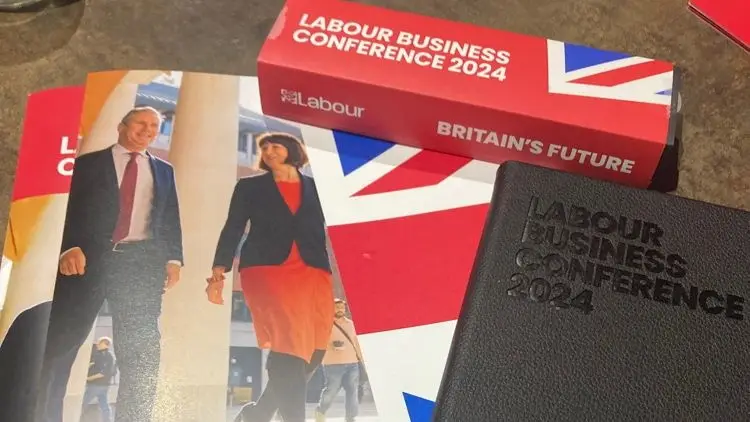The Labour Business Conference held on February 1, 2024, was the largest event focused on the business community in the party’s history. Some 400 business leaders were at The Oval, with a further 200 joining in the evening, including the likes of Google, Goldman Sachs, Microsoft and PLMR’s Head of Energy and Sustainability, Patrick Cousens and Account Director, Dan Baynes. Below Dan draws on some of his thoughts from the Conference.
Labour Party Officials we spoke to at the end of the Conference were thrilled with how it went. This was a very slick & professional operation, with the party keen to demonstrate its stated commitment to working in close partnership with business.
We heard keynote speeches from Labour Leader Keir Starmer and Shadow Chancellor Rachel Reeves, a panel focused on Labour’s approach to technology and skills (with Shadow Education Secretary, Bridget Philipson and Shadow Secretary for Science Innovation and Technology, Peter Kyle) as well as further detail on the party’s “partnership for growth” with Shadow Business Secretary, Jonathan Reynolds.
The roundtables held with Labour politicians from across different portfolios – often seen as a stage management exercise – were approached by party figures genuinely willing to discuss and listen to feedback on individual policies.
The New Partnership for Growth – Labour’s Plan for Business:
At the heart of the conference was Labour’s new document: Business Partnership for Growth. This plan outlines Labour’s strategy for fostering collaboration between the government and businesses to drive economic growth. There is a genuine desire from the party to achieve the five missions in collaboration with businesses, the document sees a “contract” with four points a Labour Government would expect of the business community and vice versa. There are also five new points to contribute to the economic growth mission:
- To put economic stability first – through firm fiscal rules, committing to one Budget only a year at least four months before the new tax year and through a cap on corporation taxes over the next five years.
- To back British business – through a new Industrial Strategy (building on the May Government’s approach from 2017), a 10-year R&D budget and a new approach to trade policy and the relationship with the EU.
- To get Britain building – through reform of the planning system to build 1.5 million homes, a National Wealth Fund and a British Infrastructure Council to push through critical projects.
- To kickstart a “skills revolution” – by replacing the apprenticeship levy with a “Growth and Skills Levy”, the creation of Skills England to ensure businesses can provide more of a steer of the skills they need and a new generation of Technical Excellence Colleges, offering more high-quality apprenticeships working with local leaders.
- To ensure economic growth reaches everywhere and that work pays – through further devolution, a “New Deal for Working People” and policies to support the physical and mental health and wellbeing of the workforce.
New vehicles for businesses to have their voices heard:
The Party is keen to have a “frank and open dialogue” with businesses and has set up several bodies to facilitate this. This includes an Industrial Strategy Council backed on a statutory footing, a new Regulatory Innovation Office to focus on the technologies of the future and a British Infrastructure Council to advise on funding and delivering critical infrastructure.
Labour officials also emphasised that they would welcome heating from businesses who are able to host visits and announcements during the forthcoming election campaign.
Life Sciences and Financial Services:
Labour unveiled new plans for two key sectors – Life Sciences and Financial Services. These initiatives aimed at creating a conducive environment for innovation and growth for the UK to become a global leader in these industries. (See our colleague Seb’s views on the Life Sciences plans here). Expect more of these “sector plans” to be published by Labour in the coming months.
Labour’s Embrace of AI:
One of these sector plans will be on AI. The conference showcased a growing interest within the Labour Party in shaping policies around artificial intelligence (AI). Both Peter Kyle MP and Matt Rodda MP provided insights into the party’s evolving stance on the issue. Kyle stated that if we can get safety and we can earn the trust of people on AI then we can start focusing on the opportunities that it has for education, health, delivery of public services and updating the welfare state.
Tackling The Blockers to Building:
A major focus of the conference was on addressing the obstacles hindering construction, planning, and infrastructure development. The party emphasised the need to expedite projects and streamline bureaucratic processes. Labour was keen to promote its pledge to build 1.5 million homes and reform the grid to overhaul the UK’s energy system.
An Overly Cautious approach:
Despite the party’s bold plans, there lingered a sense of caution among the speakers. Rachel Reeves promised caps on corporation tax, no caps on banker’s bonuses and there were whispers of a possible U-turn on how private equity will be taxed. The £28 billion pledge for green investment dominated many discussions and has now seen the party U-turn. All of this hinted that despite the progress made, Labour remains nervous of making commitments which expose them to perceived political risk, including being seen to upset the business community.
Devolution – The Elephant Not in the Room:
Surprisingly, devolution – a key aspect of Labour’s programme – received limited attention during the conference. We heard from Mayor of London, Sadiq Khan and Mayor of West Yorkshire, Tracy Brabin, albeit briefly compared to the other speakers. It felt as though the City of London was prioritised on the day.
Conclusion:
The Labour Business Conference provided valuable insights into the party’s economic vision. It is clear that a partnership approach is being prioritised, and the conference has set the stage for ongoing dialogue. The business community should feel encouraged that well thought-through asks and constructive ideas will receive a warm reception from a party which recognises the integral role of business and growth to the UK economy and the wellbeing of its citizens.





